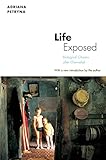Life Exposed : Biological Citizens after Chernobyl / Adriana Petryna.
Material type: TextPublisher: Princeton, NJ : Princeton University Press, [2013]Copyright date: ©2013Edition: With a New introduction by the authorDescription: 1 online resource (304 p.) : 1 halftone. 2 line illus. 2 tables. 2 mapsContent type:
TextPublisher: Princeton, NJ : Princeton University Press, [2013]Copyright date: ©2013Edition: With a New introduction by the authorDescription: 1 online resource (304 p.) : 1 halftone. 2 line illus. 2 tables. 2 mapsContent type: - 9780691151663
- 9781400845095
- Chernobyl Nuclear Accident, Chornobylʹ, Ukraine, 1986 -- Environmental aspects
- Chernobyl Nuclear Accident, Chornobylʹ, Ukraine, 1986 -- Health aspects
- Chernobyl Nuclear Accident, Chornobylʹ, Ukraine, 1986 -- Social aspects
- Radioactive pollution -- Ukraine
- SOCIAL SCIENCE / Anthropology / General
- Chernobyl aftermath
- Chernobyl disaster
- Chernobyl explosion
- Chernobyl nuclear reactor
- Chernobyl sufferers
- Exclusion Zone
- Radiation Research Center
- Safe Living Concept
- Soviet Union
- Ukraine
- accountability
- biological citizenship
- biological injury
- bioscientific collaboration
- catastrophe
- clinicians
- compensation
- corruption
- disability claims
- disability
- doctorаatient relations
- environment
- ethics
- families
- family histories
- health
- human rights
- human welfare
- illness
- in utero research
- lichnost'
- life narratives
- medical classification
- medical surveillance
- medical-labor committees
- nonsufferers
- nuclear hazard
- patients
- personhood
- post-Soviet Ukraine
- public health
- radiation dose exposure
- radiation research
- radiation scientists
- radiation
- radioactive fallout
- self
- sick role sociality
- social equity
- social health
- social identity
- social protection
- social welfare goods
- state building
- sufferers
- suffering
- technological disasters
- violence
- welfare claims
- 363.1799094777 23
- RA569
- online - DeGruyter
- Issued also in print.
| Item type | Current library | Call number | URL | Status | Notes | Barcode | |
|---|---|---|---|---|---|---|---|
 eBook
eBook
|
Biblioteca "Angelicum" Pont. Univ. S.Tommaso d'Aquino Nuvola online | online - DeGruyter (Browse shelf(Opens below)) | Online access | Not for loan (Accesso limitato) | Accesso per gli utenti autorizzati / Access for authorized users | (dgr)9781400845095 |
Frontmatter -- Contents -- Figures and Tables -- Introduction to the 2013 Edition: How Did They Survive? -- Acknowledgments -- Note on Transliteration -- Chapter 1: life Politics after Chernobyl -- Chapter 2: Technical Error: Measures of life and Risk -- Chapter 3: Chernobyl in Historical Light -- Chapter 4: Illness as Work: Human Market Transition -- Chapter 5: Biological Citizenship -- Chapter 6: Local Science and Organic Processes -- Chapter 7: Self and Social Identity in Transition -- Chapter 8: Conclusion -- Notes -- Bibliography -- Index
restricted access online access with authorization star
http://purl.org/coar/access_right/c_16ec
On April 26, 1986, Unit Four of the Chernobyl nuclear reactor exploded in then Soviet Ukraine. More than 3.5 million people in Ukraine alone, not to mention many citizens of surrounding countries, are still suffering the effects. Life Exposed is the first book to comprehensively examine the vexed political, scientific, and social circumstances that followed the disaster. Tracing the story from an initial lack of disclosure to post-Soviet democratizing attempts to compensate sufferers, Adriana Petryna uses anthropological tools to take us into a world whose social realities are far more immediate and stark than those described by policymakers and scientists. She asks: What happens to politics when state officials fail to inform their fellow citizens of real threats to life? What are the moral and political consequences of remedies available in the wake of technological disasters? Through extensive research in state institutions, clinics, laboratories, and with affected families and workers of the so-called Zone, Petryna illustrates how the event and its aftermath have not only shaped the course of an independent nation but have made health a negotiated realm of entitlement. She tracks the emergence of a "biological citizenship" in which assaults on health become the coinage through which sufferers stake claims for biomedical resources, social equity, and human rights. Life Exposed provides an anthropological framework for understanding the politics of emergent democracies, the nature of citizenship claims, and everyday forms of survival as they are interwoven with the profound changes that accompanied the collapse of the Soviet Union.
Issued also in print.
Mode of access: Internet via World Wide Web.
In English.
Description based on online resource; title from PDF title page (publisher's Web site, viewed 30. Aug 2021)


